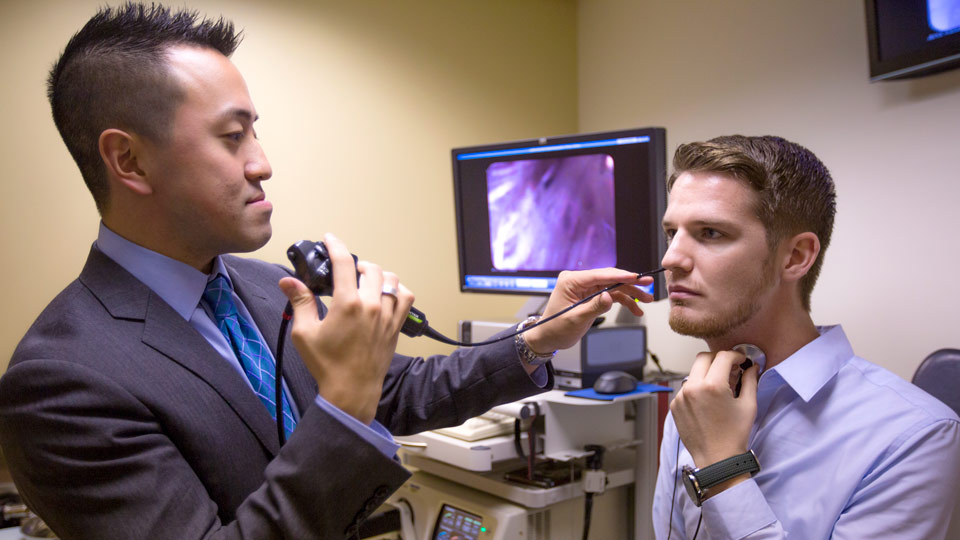How to Choose an ENT Over a General Practitioner for Persistent Issues
How to Choose an ENT Over a General Practitioner for Persistent Issues
Blog Article
Exploring the Area of Otolaryngology: What to Anticipate When You Consult an ENT
Otolaryngology, typically referred to as ENT, incorporates the diagnosis and treatment of throat, ear, and nose disorders. For those experiencing related concerns, seeking advice from an ENT expert can provide clearness and alleviation. Comprehending what to expect throughout such appointments is essential for reliable interaction and care. This summary will outline vital elements of the ENT experience, including common reasons for brows through and the procedures included in diagnosis and therapy.

Recognizing Otolaryngology: A Review
Otolaryngology, usually referred to as ENT (Throat, nose, and ear) medicine, is a customized branch of medicine that concentrates on the medical diagnosis and treatment of conditions influencing these vital areas of the body. This area includes a wide variety of conditions, consisting of those pertaining to hearing, balance, respiratory function, and speech. Otolaryngologists are trained to manage both medical and surgical treatments, making use of advanced techniques and innovations. Their know-how expands beyond traditional ailments, addressing concerns such as allergies, sinus infections, and hearing loss. Furthermore, they play a crucial duty in the monitoring of head and neck cancers, providing detailed care customized to private person requirements. On the whole, otolaryngology stays crucial for maintaining health and quality of life in affected people.
Typical Factors to See an ENT Expert
Numerous people seek the experience of an ENT expert for a variety of factors, showing the diverse nature of problems that affect the throat, nose, and ear. Usual concerns include chronic sinusitis, which typically brings about consistent nasal blockage and facial pain. Allergic reactions and their linked signs, such as sneezing and itching, also prompt visits to these specialists (Hearing). Hearing loss, whether gradual or unexpected, is an additional substantial factor for examination. On top of that, people may look for assessment for throat problems, consisting of consistent hoarseness or ingesting difficulties. Rest apnea, defined by cut off breathing throughout sleep, is regularly resolved by ENT professionals. Each of these conditions highlights the value of specialized treatment in managing complicated ENT-related wellness issues
Preparing for Your ENT Visit
When planning for an ENT visit, it is vital to gather appropriate details and think about any kind of specific issues. Clients ought to put together an in-depth case history, consisting of previous ear, nose, or throat issues, surgeries, and existing medications. Documenting signs-- such as period, frequency, and intensity-- can provide important insights for the ENT professional. Additionally, individuals should prepare a list of questions they want to ask, making certain that all concerns are dealt with throughout the go to. Bringing along any kind of relevant medical documents or examination outcomes can further aid the ENT in comprehending the individual's problem. Finally, people should confirm their visit information, consisting of area, time, and day, to lessen any last-minute complication. Appropriate prep work can boost the efficiency of the examination and result in much better end results.
What to Anticipate Throughout the Consultation
As the examination begins, the person can anticipate to engage in a detailed conversation with the ENT professional regarding their signs and symptoms and clinical history. The professional will make inquiries concerning the period, frequency, and seriousness of signs such as hearing loss, nasal congestion, or sore throat. Furthermore, the person's previous medical problems, medications, and any pertinent household history will be assessed, aiding the expert in developing a complete understanding of the individual's health. The ENT might also ask about way of living variables, such as direct exposure to irritants or irritants. This open dialogue establishes a foundation for the appointment, guaranteeing that the person's problems are attended to and establishing the stage for any type of essential evaluations or suggestions for therapy.
Analysis Examinations and Procedures in Otolaryngology
A series of analysis tests and treatments are essential in otolaryngology to precisely review and diagnose conditions influencing the nose, ear, and throat. Typical examinations include audiometry, which determines hearing feature, and tympanometry, examining center ear pressure. Nasal endoscopy permits visualization of the nasal passages and sinuses, while laryngoscopy checks out the throat and vocal cords. Imaging strategies, such as CT scans and MRIs, provide detailed sights of head and neck structures. Allergic reaction testing may additionally be carried out to identify triggers for sinus or breathing issues. These diagnostic devices allow ENT professionals to create a detailed understanding of individuals' problems, making sure tailored and effective monitoring plans. Correct medical diagnosis is necessary for effective therapy outcomes in otolaryngology.
Therapy Options Supplied by ENT Specialists
ENT professionals offer a selection of treatment options tailored to deal with details problems influencing the ear, nose, and throat. These treatments vary from conventional methods, such as drug and way of life modifications, to more invasive procedures. Allergic reactions might be taken care of with antihistamines or immunotherapy, while chronic sinusitis could call for nasal corticosteroids or sinus surgery. For hearing loss, ENT specialists commonly recommend listening devices or surgical treatments like cochlear implants. In cases of throat disorders, choices can include speech therapy or procedures to eliminate blockages. Additionally, they might provide advice for handling sleep apnea, consisting of using CPAP devices or medical interventions. Overall, the goal is to improve individuals' quality of life with personalized care and effective treatment methods.
When to Seek Follow-Up Care With an ENT
When to seek follow-up care with an ENT specialist is vital for managing recurring signs and symptoms or complications associated to throat, ear, and nose conditions, recognizing. Patients ought to consider setting up a follow-up consultation if signs and symptoms continue regardless of preliminary therapy, such as chronic ear discomfort, nasal blockage, or throat pain. Changes in hearing, equilibrium problems, or unusual nasal discharge may also necessitate further analysis. Furthermore, if a client experiences adverse effects from recommended medicines or has undertaken a surgical procedure, follow-up treatment is essential to keep track of recovery and address any kind of problems. Timely assessments can assure efficient administration of problems, prevent prospective issues, and offer assurance pertaining to one's health. Seeking follow-up treatment promotes proactive health administration in otolaryngology.
Often Asked Concerns

What Qualifications Should I Look for in an ENT Specialist?
When looking for an ENT professional, one ought to seek board certification, appropriate experience, and strong patient testimonials. Additionally, efficient communication skills and a caring approach can significantly enhance the general therapy experience.
How Do I Select the Right ENT for My Demands?
Selecting the ideal ENT professional entails assessing their credentials, experience, and patient testimonials (ENT Doctor). It is vital to contemplate their interaction design and technique to treatment, guaranteeing they straighten with the individual's particular wellness needs and preferences
Are There Any Type Of Dangers Associated With ENT Procedures?
The risks connected with ENT procedures may include infection, bleeding, anesthetic difficulties, and potential damages to bordering frameworks. Clients should go over these risks with their medical professional to more info comprehend individual worries and guarantee educated choices.
Just How Can I Handle Anxiety Prior To My ENT Consultation?
To manage anxiety prior to a consultation, individuals can practice deep breathing exercises, imagine positive results, prepare questions beforehand, and seek support from close friends or household, cultivating a feeling of reassurance and peace.
What Should I Do if I Experience Side Effects From Therapy?
If negative effects from treatment happen, the person must immediately report them to their doctor. Modifications to therapy or extra interventions may be essential to guarantee safety and performance in managing their condition - Otolaryngology. As the consultation starts, the individual can expect to involve in an extensive conversation with the ENT specialist concerning their signs and clinical background. These diagnostic devices enable ENT experts to create an extensive understanding of clients' problems, making sure tailored and effective management plans. ENT specialists use a selection of treatment choices tailored to resolve particular conditions influencing the nose, throat, and ear. When seeking an ENT specialist, one should look for board accreditation, pertinent experience, and solid person evaluations. Choosing the ideal ENT expert includes assessing their credentials, experience, and individual testimonials
Report this page